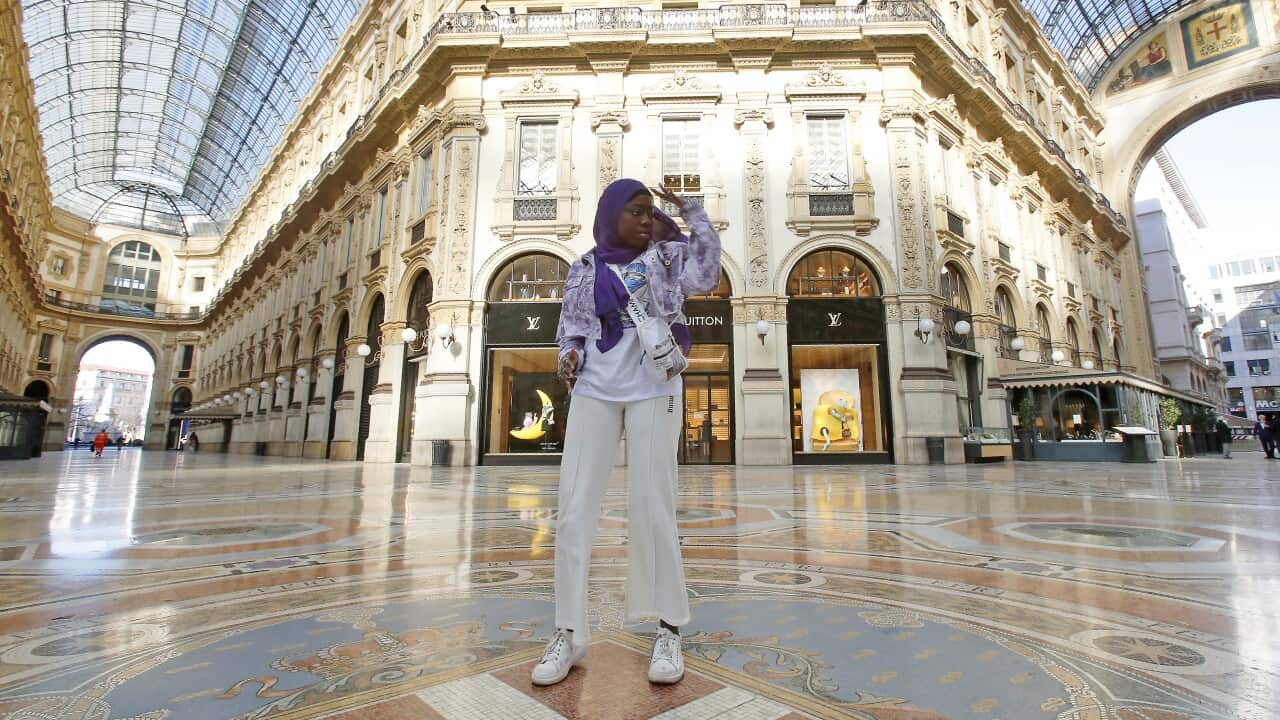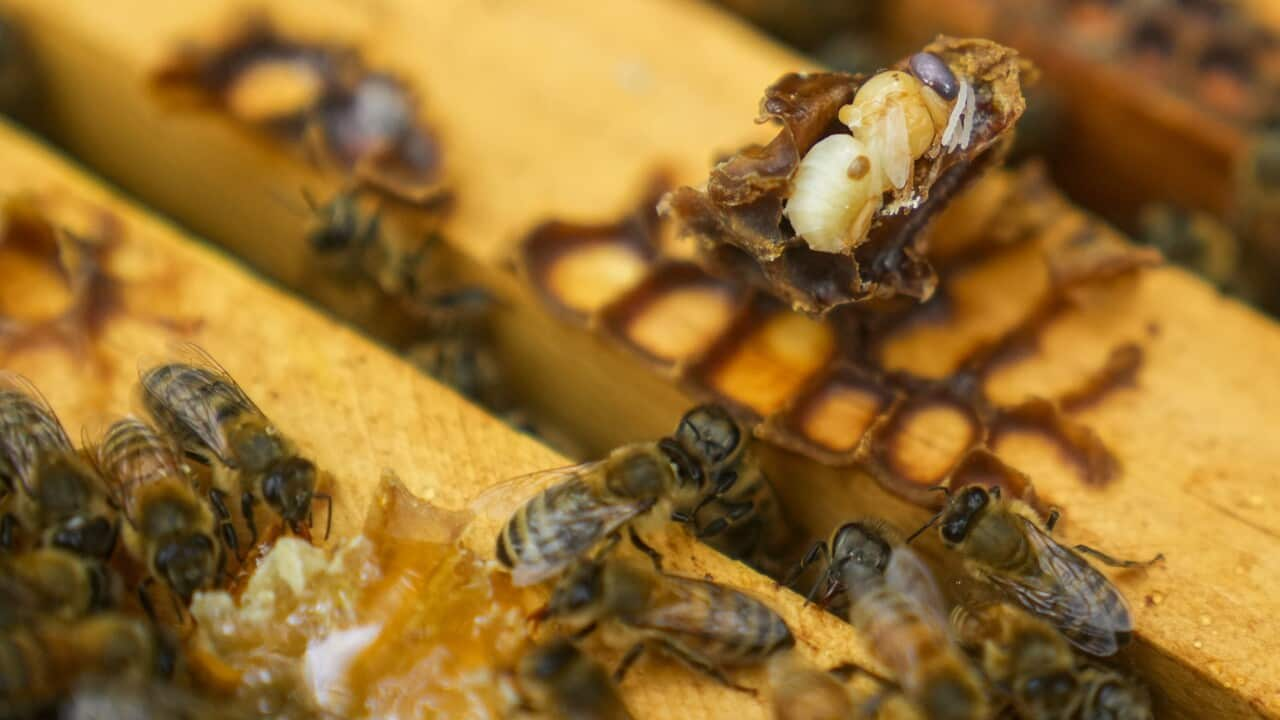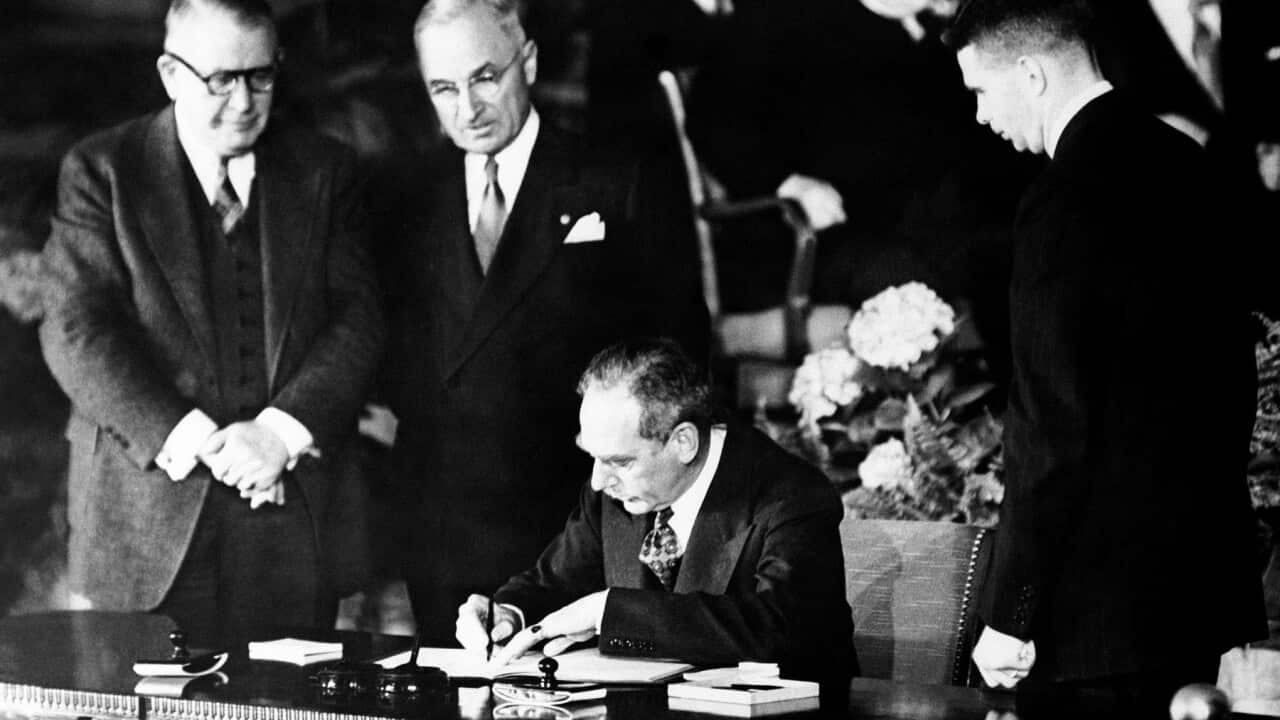Italian
Nel mezzo della Galleria Vittorio Emanuele di Milano, una giovane donna musulmana con un hijsb viola posiziona il suo smart phone sul pavimento di marmo e inizia a ballare al ritmo della musica proveniente dall'apparecchio.
TIK TOK MUSIC
La 19enne Aida Diouf Mbengue sta realizzando un video per TikTok da condividere con i suoi 330mila followers.
Ha iniziato sulla piattaforma nel 2019.
Tik Tok è una app per la condivisione di video dove gli utenti creano una grande varietà di video dal formato breve.
Aida si descrive come una influencer afro-musulmana.
Aida è immigrata in Italia con sua madre Die dal Senegal quando aveva tre anni.
Vive con i suoi genitori ed i suoi otto fratelli e sorelle in un piccolo appartamento nel nord Italia e posta decine di video al giorno.
Ha unito le sue forze con un gruppo di giovani italo-africani per cercare di aumentare la loro influenza sui social media.
Da prima influencer africana con un hijab, Aida sta infrangendo le barriere e gli stereotipi in Italia.
Ma non si tratta solo di visualizzazioni e followers o di divertimento spensierato.
Italian then translated: "I started receiving these discriminatory messages when I started putting my face on social media, then I started becoming known. The discriminatory sentences included the 'N' word, or monkey, go back to your country, I will throw a banana in your face. But then you realize it is just the usual people who want to make you feel bad so in the end either you laugh about it or you just let it go and that's it."
Spesso è bersaglio di commenti razzisti, ma sostiene di aver imparato ad ignorarli con un sorriso e una risata, per poi mettersi al lavoro per il suo post successivo.
Aida racconta di essere più delusa dai commenti negativi provenienti da chi indossa un hijab e che la criticano perché lo indossa.
Italian then translated: "For me it is harder to receive criticism from your own group, many of them say "I don't believe in what you are doing, you put on the veil to have more views and to get more followers when the truth is I have been wearing the veil since I was seven years old, it's not like I started to wear it to do Tik Tok."
Il gruppo di influncer italiani è stato creato dal 22enne Moustapha Thaim nel maggio del 2020.
La sua idea era di riunire un gruppo di amici provenienti dall'Africa per dare voce alla loro comunità.
Italian then translated: "Afro-influencers was born in May 2020 in the middle of lockdown. It was an idea that came to me because I was already an influencer and I saw that there were other guys like me that were influencers, all of them of African origin."
Thaim rivela che tutti i membri del gruppo hanno ricevuto insulti o minacce, ma che la loro forza è saper reagire con umorismo e ispirare altre persone provenienti da comunità multiculturali a realizzare che possono avere uno spazio sulla piattaforma.
La fashion designer Stella Jean, che è l'unica Fashion Designer nera nella Camera della Moda e fondatrice di "Black Lives Matter in Italian Fashion", ha dichiarato che Aida è una fonte d'ispirazione.
"Seeing someone doing TikTok might seem like something frivolous and superficial. She had to fight and push herself to get to this point, now she is starting to gather the reward for her effort and overcoming the resistance, the discrimination and prejudices and to impose her point of view. What she is doing is important not just for her but for an entire generation of new Italians and the new multicultural Italy. This is the new face of Italy and we are not going back, because the only part of this country that is growing are the children of migrants."
L'Italia ha una popolazione di oltre 60 milioni di persone e quasi il nove per cento è composto da cittadini stranieri.
Di questi, quasi un quinto proveine da paesi africani.
English
In the centre of Milan's Victor Emmanuel Gallery, a young Black Muslim woman with a violet-coloured hijab positions her smart phone on the marble floor and begins to dance to the music being played from the device.
TIK TOK MUSIC
19-year-old Aida Diouf Mbengue is making a Tik-Tok video to share with her 330,000 followers.
She joined the platform in 2019.
Tik Tok is a video-sharing app where users make a variety of short-form videos.
Aida describes herself as a Muslim Afro-Influencer.
Aida migrated to Italy with her mother Die from Senegal when she was three years old.
In a small apartment in northern Italy, she lives with her parents and eight brothers and sisters, and posts dozens of videos per day.
She has teamed up with a group of young Africa-Italians to try to increase their influence on social media.
As the first Afro- Influencer with a hijab, Aida is breaking down barriers and stereotypes in Italy.
But this is not just about views and followers, or fun and games.
Italian then translated: "I started receiving these discriminatory messages when I started putting my face on social media, then I started becoming known. The discriminatory sentences included the 'N' word, or monkey, go back to your country, I will throw a banana in your face. But then you realize it is just the usual people who want to make you feel bad so in the end either you laugh about it or you just let it go and that's it."
She is often targeted with racist comments, but says she has learned to shrug them off with a smile and a laugh, then gets to work on her next post.
Aida says she is more disappointed by negative comments from people who also wear a hijab, who criticise her for wearing it.
Italian then translated: "For me it is harder to receive criticism from your own group, many of them say "I don't believe in what you are doing, you put on the veil to have more views and to get more followers when the truth is I have been wearing the veil since I was seven years old, it's not like I started to wear it to do Tik Tok."
The Italian group of influencers was founded by 22-year-old Moustapha Thaim in May 2020.
His idea was to bring together a group of friends of African background to give voice to their community.
Italian then translated: "Afro-influencers was born in May 2020 in the middle of lockdown. It was an idea that came to me because I was already an influencer and I saw that there were other guys like me that were influencers, all of them of African origin."
He says all members of the group have received insults or threats, but their strategy is to react with humour and inspire others from multicultural communities to feel like they can have a place on the platform.
Fashion designer Stella Jean, who is the only black Fashion Designer in Italy's chamber of Fashion and founder of "Black Lives Matter in Italian Fashion", says Aida is an inspiration.
"Seeing someone doing TikTok might seem like something frivolous and superficial. She had to fight and push herself to get to this point, now she is starting to gather the reward for her effort and overcoming the resistance, the discrimination and prejudices and to impose her point of view. What she is doing is important not just for her but for an entire generation of new Italians and the new multicultural Italy. This is the new face of Italy and we are not going back, because the only part of this country that is growing are the children of migrants."
Italy has a population of just over 60 million, and almost nine percent of that is made up of foreign nationals.
Of those foreigners, nearly one-fifth of them come from African countries.
Report by Marcus Megalokonomos




